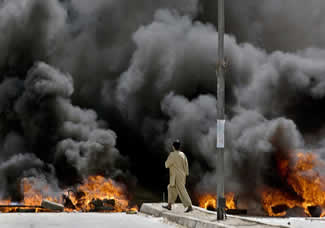
My sister texted me from Islamabad, wondering, "is this another Bangladesh"? In some ways, she's right, because the Baluch nationalists feel as aggrieved as the erstwhile East Pakistanis did. At this juncture, the two main factors that are responsible for the Baluchistan situation are perhaps ratcheted up to their highest level: the economic exploitation of Baluchistan (mainly natural gas), and the brutal military repression and occupation of the region. The last Baluchistan crisis was in the 1970s, but that was eventually forcibly suppressed, with the military especially keen to hold on to a restive province immediately after another one had been "lost." This time around, a military government is in power, which enjoys (on most days) the support of the U.S., and which can use the convenient ruse of the "War on Terror" to crack down on any and all domestic opponents.
This, by the way, is not meant to be a tribute to Bugti. But he was held in high regard and affection by his people, and his death may yet prove to be one of those highly charged symbolic events that finally galvanize a people past the tipping point. In any case, I fear there will be much more violence to come in the immediate future, whatever happens.
In a weird coincidence, the U.S.-based Armed Forces Journal recently published an argument for redrawing boundaries in the "Greater Middle East," which includes Pakistan. According to this argument, Baluchistan would become an independent country. (Pakistan would be downsized to existing Punjab and Sindh only, with NWFP going to Afghanistan.) This is completely counter to what the Pakistan establishment wants, but it is a chilling reminder of the kind of influence and ambition U.S. policymakers have in the region.
No comments:
Post a Comment